Has stadium rock been unplugged?
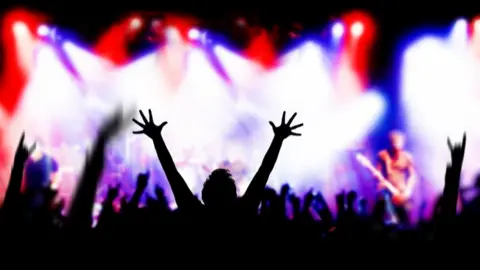 Getty Images
Getty ImagesFor many, imagining a sell-out stadium show conjures up the image of the classic rock band line-up; the posturing frontman, the charismatic lead guitarist, the perfect partnership between drums and bass keeping the heavy melodies rolling.
The music itself can range from the hair metal kings of Guns N' Roses and AC/DC, through to the British institutions of The Rolling Stones or Queen.
It is that unit, those domineering guitars and those anthemic sing-alongs, that define the "stadium rock" sound.
And today tickets go on sale for the original hair rockers Bon Jovi, returning to the stage at Wembley Stadium for the first time in 18 years.
But after a decade of pop acts dominating the hallowed ground - the only artists to have headlined this year being Taylor Swift and Ed Sheeran - is it too late? Has the era of stadium rock been unplugged and relegated to smaller venues?
Or can the rock and roll bands of the future still dream big?
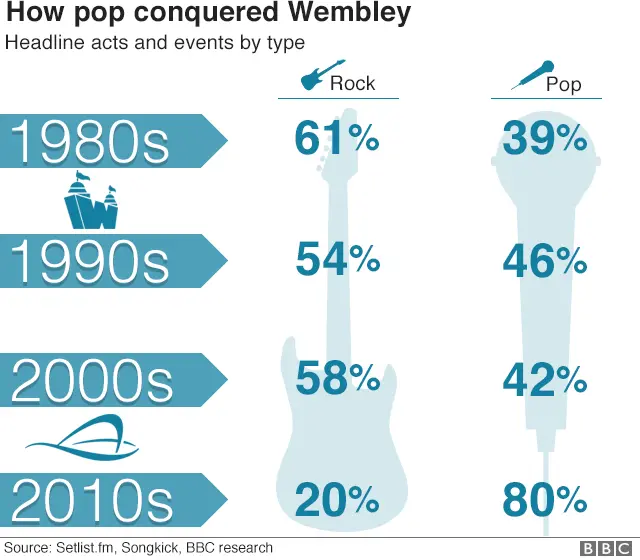

Chris Robertson, the lead singer of US hard rock band Black Stone Cherry, dreams of dominating the stage.
The four-piece was founded in the early 2000s and plays arenas both at home and abroad.
It was seeing his idols perform for an entire stadium that first made Chris want to play for thousands more.
"These are the bands that every kid aspires to be when they first pick up a guitar," he says.
"You want to be Slash, Angus Young, Steven Tyler... all these iconic acts."
 Download Festival
Download FestivalThere is no tinge of jealousy in Chris' voice - he's gearing up for a UK arena tour in December - just admiration and the belief that the talent of these bands demands huge stages.
"Their music, it connects with people," he says. "And that is the goal - to have your music connect with as many people as possible."
'What will be left?'
For the lead singer of Danish band Volbeat, Michael Poulsen, it's the draw of those massive stadium bands he has to thank for his own success.
Heavy metal legends Metallica fell in love with Volbeat's unique blend of metal and rockabilly, and took them out on the road, leading to success in their own right, playing arenas and festivals.
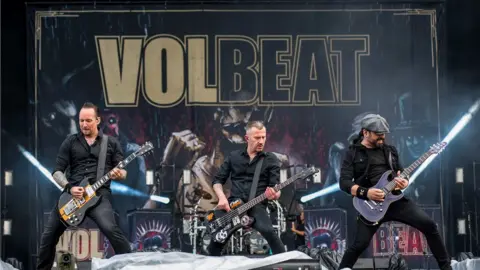 Download Festival
Download FestivalBut Michael does wonder if they will ever grab the stadium headline slot.
"It is going to be interesting to see what will be left when the big stadium bands say goodbye," he says.
"Those huge bands like Metallica and Iron Maiden, AC/DC, Ozzy Osborne... who is there to be the next generation?"
'An inspiration'
Finnish metal group Nightwish often play to crowds of 80,000 upwards in Europe when they feature on festival bills, and they are due to play at UK arenas later this year.
But they still have not headlined a stadium.
Like many before him, it was a big stadium show with Metallica and Guns N' Roses that opened the doors of rock music to their lead songwriter, Tuomas Holopainen.
But for him, the dream is about playing live, not the size of the crowds.
"It has never been a thing for me," he says, ahead of a headline slot at Bloodstock Festival. "Our manager tells us these are the gigs that you're going to play, then at some point you realise you are playing just before Iron Maiden. Really? Wow!
"I think it's an inspiration, not a frustration."
Allow Instagram content?

Thunder have been there, seen it and got the band t-shirts more than a decade before many of these bands even started playing.
Formed in 1988 at the height of the hair metal revolution, the five piece have toured the world with huge hits like Love Walked In, and played some of the biggest stadiums on offer.
But like their younger counterparts, it was seeing other acts play those huge venues that motivated them.
"The first time we played a stadium, it felt a little bit alien, but it also felt like where we should be," says Luke Morley, the band's guitarist and songwriter.
"It was the next extension of putting the hard work in."
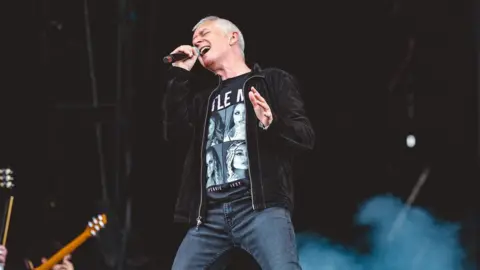 Download Festival
Download FestivalSome critics have hit out at old school acts that still dominate the big stages, and who might block newer bands from reaching dizzying heights.
However, Thunder think their success also acts as an inspiration for upcoming groups.
"Everyone still has to find a way," says Danny Bowes, the band's lead singer.
"Look around, there's loads of young bands, they're all aspiring and I think they should be inspired by seeing other bands further up the bill.
"There's no reason they can't be there and the old bands are not going to last forever."
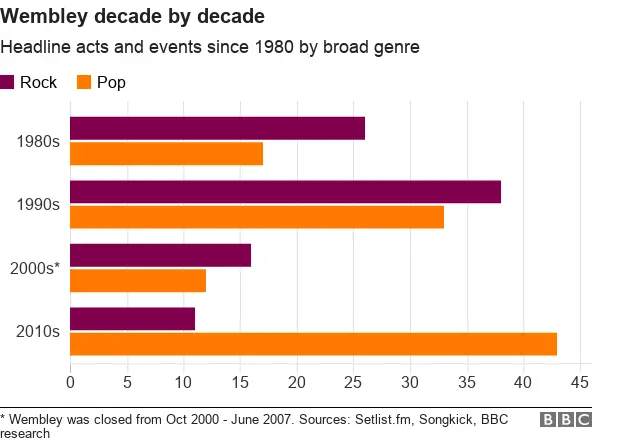

How did we do this?
We looked back at every concert or event in Wembley's history since 1980 and gave it a value as a "pop" or "rock" event. Shows with the same performers playing over multiple nights were counted separately.
For some events, such as 2007's Live Earth, where a mixture of rock and pop acts performed, we assigned the value which best fitted the majority of artists.

Alexander Milas, the former editor in chief of Metal Hammer magazine, still believes rock acts are a big part of the stadium circuit, but a change in the industry has made it harder to reach the top.
"When it comes to new acts, it isn't just about the next big thing these days," he says.
"More frequently it's about the next mid-sized dozen things, or the next really-small-but-absolutely-brilliant hundred things you've heard about via your friends."
He also says the phenomenon of the established bands' back catalogue - now exceeding the sale of new records for the first time - puts another hurdle in the way of younger bands.
"That's a radical shift and a whole new world," said Alexander. "The era of getting signed as a route to fortune certainly seems to be over but for a very precious few."
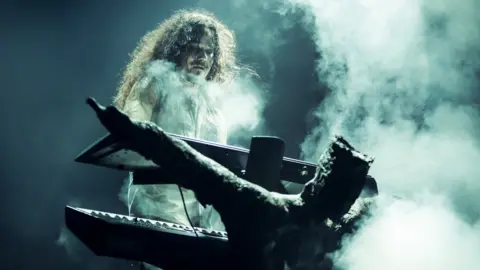 Nightwish
NightwishWembley Stadium, the iconic London venue, says if the bands can attract the fans (up to 98,000 for a sell-out show) they are welcome at the venue - whatever their sound.
Stadium senior commercial manager James Taylor says: "While the 80's and 90's were a particularly strong period for rock music both at Wembley and around the world, there is undoubtedly still a place for this genre at the stadium.
"In recent years... the feedback shows there is still an appetite for this to continue and music is a high priority for this venue."
'Live and loud'
For the bands, they believe people are always going to want to hear music "live and loud".
"That is never ever going to change," says Nightwish's Tuomas.
And he welcomes the variety of acts taking up the mantle.
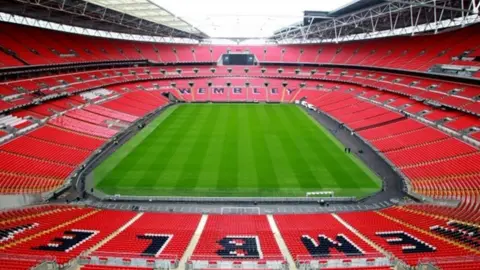 Wembley Stadium
Wembley Stadium"Look at Ed Sheeran," he says. "It is not my cup of tea, but he is filling stadiums all around the world with just a guitar.
"If one guy with one guitar can fill up Wembley Stadium for four nights, that is amazing."
Volbeat's Michael definitely sees stadium music as a spectrum now, rather than just its classic rock roots.
"You can have stadium pop, you can have stadium rock, and you can have an extreme band like Slipknot fill a stadium," he said. "It is impressive."
And the ambition is still there.
"You want to be a band that conquers the world," says Black Stone Cherry's Chris. "There is still the potential for bands to get to that level."
He admits it is harder to reach those heights, "even to reach the larger theatres and arenas, so stadiums seem like a far cry".
But he adds: "When you play, you have got to have that mentality that you can get there - not cockiness, but determination that anything is possible."
